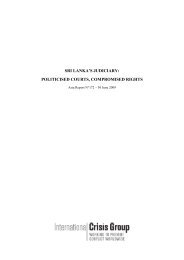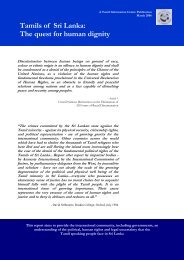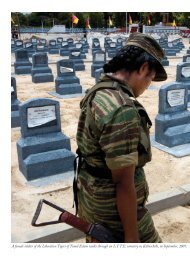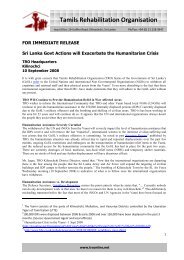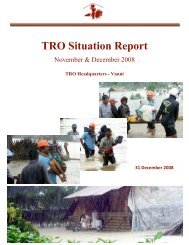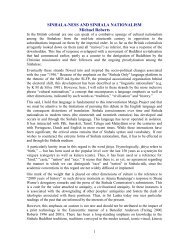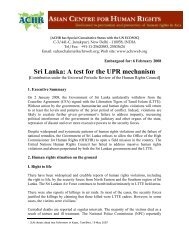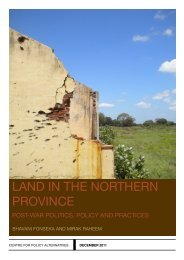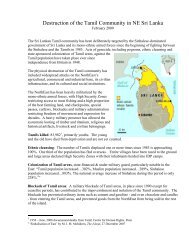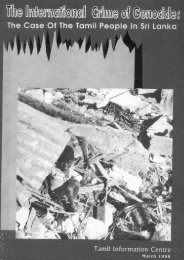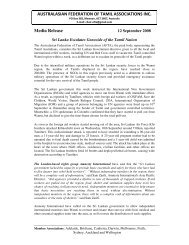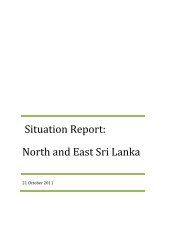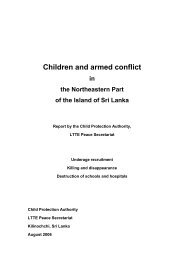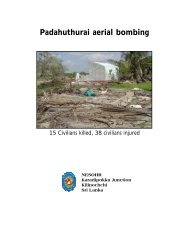The Conflict in Sri Lanka: Ground Realities - Ilankai Tamil Sangam
The Conflict in Sri Lanka: Ground Realities - Ilankai Tamil Sangam
The Conflict in Sri Lanka: Ground Realities - Ilankai Tamil Sangam
Create successful ePaper yourself
Turn your PDF publications into a flip-book with our unique Google optimized e-Paper software.
usually tends to be obfuscated <strong>in</strong> discussions on the structure of<br />
the state, or on federal versus unitary constitutions, is that they<br />
represent different aspects of the m<strong>in</strong>dset of the rul<strong>in</strong>g class <strong>in</strong><br />
Colombo. Whether we like it or not, the rul<strong>in</strong>g class has with<strong>in</strong><br />
itself substantial elements which are loath to share political power<br />
with the <strong>Tamil</strong>s through constitutional means. With Rajapakse<br />
assum<strong>in</strong>g the presidency, these elements have acquired great<br />
legitimacy. What is more, no solution to the ethnic problem <strong>in</strong><br />
the future is go<strong>in</strong>g to be devoid of a substantial <strong>in</strong>put from the<br />
extreme nationalist sections of <strong>Sri</strong> <strong>Lanka</strong>’s southern population<br />
and their political representatives.<br />
It has been the ploy of the rul<strong>in</strong>g class <strong>in</strong> Colombo to speak about<br />
a consensus whenever it has had to take pa<strong>in</strong>ful decisions of<br />
shar<strong>in</strong>g power with the <strong>Tamil</strong>s. What is important <strong>in</strong> the build<strong>in</strong>g<br />
of this consensus is that the JHU with n<strong>in</strong>e seats is treated as<br />
important as the UPFA (105 seats) and UNP (82 seats)! (<strong>The</strong> actual<br />
<strong>in</strong>fluence of the JHU <strong>in</strong> gett<strong>in</strong>g Rajapakse elected as president<br />
cannot be quantified, but it is unlikely to be substantial). <strong>The</strong><br />
question we have to ask is: why is the S<strong>in</strong>hala polity, which<br />
places faith <strong>in</strong> numbers and numerical majorities (as it does <strong>in</strong><br />
parliament) to defeat everyth<strong>in</strong>g that affects its <strong>in</strong>terests, bend<strong>in</strong>g<br />
over backwards to solicit the op<strong>in</strong>ion of the m<strong>in</strong>iscule JHU? <strong>The</strong><br />
answer is obvious – to ensure that the <strong>in</strong>transigence of JHU (and<br />
of course the JVP) could be used to dilute what is offered to the<br />
<strong>Tamil</strong>s as the ‘consensus op<strong>in</strong>ion of the south,’ and thereby see<br />
to it that hegemony does not slip out of the S<strong>in</strong>hala rul<strong>in</strong>g class.<br />
<strong>The</strong> fact is that it is not the <strong>in</strong>dividual political parties that matter<br />
when decid<strong>in</strong>g what ought to be ‘conceded’ by the Colombo<br />
political elite. It is the rul<strong>in</strong>g class as a whole, which is reluctant<br />
to share power, us<strong>in</strong>g the mechanisms built <strong>in</strong>to the political<br />
system to frustrate <strong>Tamil</strong> aspirations. This is not the first time<br />
<strong>in</strong> the recent past that presidents have used the consensus<br />
card to delay act<strong>in</strong>g decisively. In 2000 for <strong>in</strong>stance, former<br />
president Chandrika Kumaratunga presented her proposal for<br />
constitutional reform. For some months preced<strong>in</strong>g this, active<br />
negotiations were undertaken by the PA with the UNP to arrive<br />
at a consensus. <strong>The</strong> upshot of it was the orig<strong>in</strong>al draft readied <strong>in</strong><br />
19



